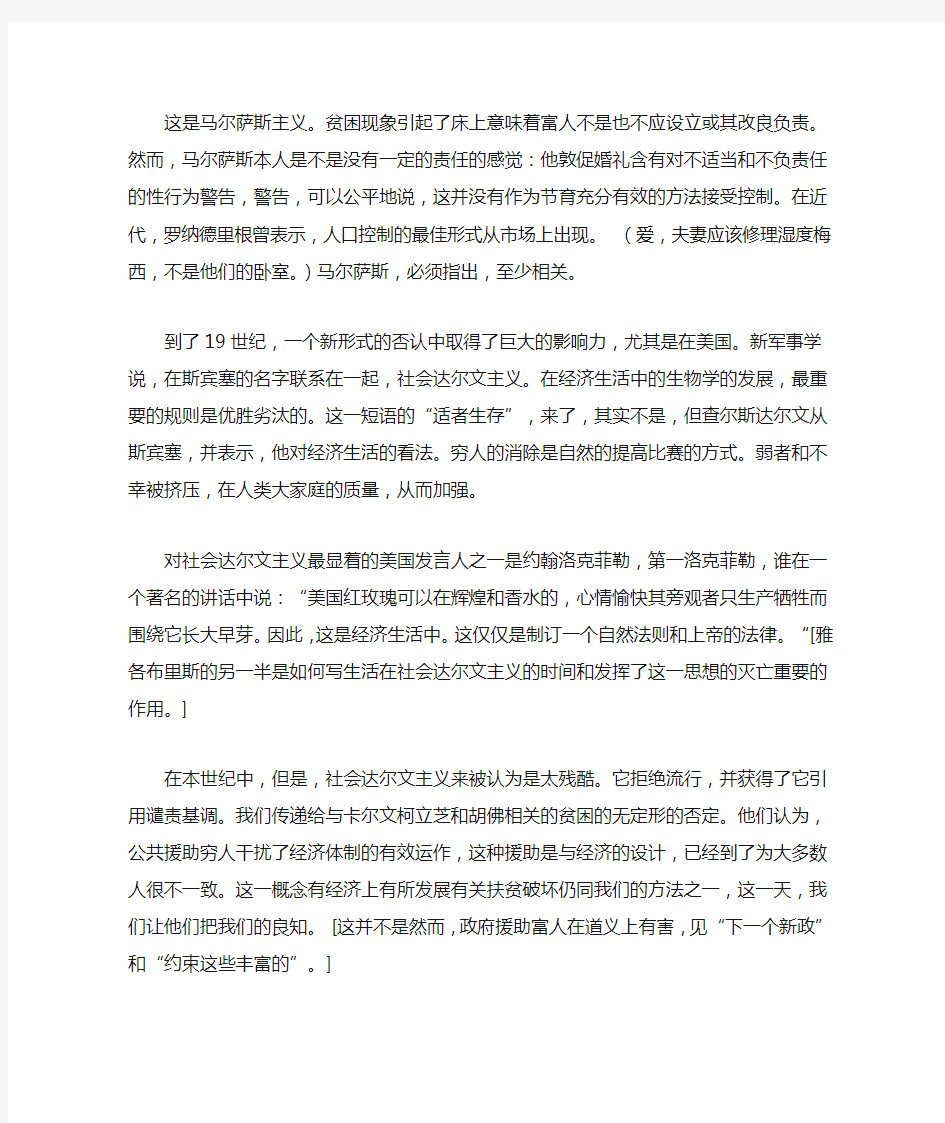How to Get the Poor off Our Conscience翻译+Summary


我想反映人类最古老的运动之一,其中多年来的过程,甚至数百年来,我们已承诺得到过我们的良知穷人。
富国和穷国共同生活,总是很不舒服,有时甚至达到危险的,因为时间的开始。普鲁塔克率领说:“一个与富国和穷国,是共和国最古老,最致命的疾病。”而继续合作,从出现的问题的富裕和贫穷的存在不平衡,尤其是过程,是好运在别人的厄运存在的理由- 已经一个世纪知识分子的当务之急。他们继续这样做我们自己的时间。一开始圣经提出的解决办法:穷人受害这个奇妙的世界,但在未来的回报。在贫困是一种暂时的不幸,如果他们是穷人,也温顺,他们最终将继承地球。这是,在某些方面,一个极好的解决方案。它允许富人享受他们的财富,而穷人嫉妒他们的未来的财富。[哈里克鲁斯的“页,从格鲁吉亚的无辜”讨论生活贫困的美化。]
很多,很久以后,在21或30年后,在国富1776年出版的英国工业革命后期黎明的问题及其解决方案开始就其现代形式。边沁,近现代的亚当斯密,想出了一个办法,以便也许五十年是非常有影响力的英国,并在一定程度时,美国的想法。这是功利主义。“到实用的原则,”边沁在1789年说:“是指主要的批准或不予批准任何行动都根据它的趋势似乎已经以增强或削弱党的利益的问题是幸福。“德的确必须是自我为中心。虽然有非常好运气,很多人以极大的厄运更多的社会问题得到解决,只要再次在边沁的话说,有“为大多数人的最大好。”学会做了最大可能的最好的多少人,一个接受,其结果可能是不幸的许多不愉快的幸福没有送达。
在1830年的一个新公式,在不小程度的影响到今天,成为政府获得了对公共良心的穷人提供。这是与大卫李嘉图,一个股票经纪人,和托马斯罗伯特马尔萨斯,一个神圣的名字。熟悉的基本条件是:穷人的贫穷是穷人的过错。它是如此,因为这是他们的过度繁殖的产品:他们却严重失控的欲望使它们繁殖到现有生活的全部限制。
这是马尔萨斯主义。贫困现象引起了床上意味着富人不是也不应设立或其改良负责。然而,马尔萨斯本人是不是没有一定的责任的感觉:他敦促婚礼含有对不适当和不负责任的性行为警告,警告,可以公平地说,这并没有作为节育充分有效的方法接受控制。在近代,罗纳德里根曾表示,人口控制的最佳形式从市场上出现。(爱,夫妻应该修理湿度梅西,不是他们的卧室。)马尔萨斯,必须指出,至少相关。
到了19世纪,一个新形式的否认中取得了巨大的影响力,尤其是在美国。新军事学说,在斯宾塞的名字联系在一起,社会达尔文主义。在经济生活中的生物学的发展,最重要的规则是优胜劣汰的。这一短语的“适者生存”,来了,其实不是,但查尔斯达尔文从斯宾塞,并表示,他对经济生活的看法。穷人的消除是自然的提高比赛的方式。弱者和不幸被挤压,在人类大家庭的质量,从而加强。
对社会达尔文主义最显着的美国发言人之一是约翰洛克菲勒,第一洛克菲勒,谁在一个著名的讲话中说:“美国红玫瑰可以在辉煌和香水的,心情愉快其旁观者只生产牺牲而围绕它长大早芽。因此,这是经济生活中。这仅仅是制订一个自然法则和上帝的法律。“[雅各布里斯的另一半是如何写生活在社会达尔文主义的时间和发挥了这一思想的灭亡重要的作用。]
在本世纪中,但是,社会达尔文主义来被认为是太残酷。它拒绝流行,并获得了它引用谴责基调。我们传递给与卡尔文柯立芝和胡佛相关的贫困的无定形的否定。他们认为,公共援助穷人干扰了经济体制的有效运作,这种援助是与经济的设计,已经到了为大多数人很不一致。这一概念有经济上有所发展有关扶贫破坏仍同我们的方法之一,这一天,我们让他们把我们的良知。[这并不是然而,政府援助富人在道义上有害,见“下一个新政”和“约束这些丰富的”。]
随着罗斯福在英国革命(如以前与劳合乔治的话),具体责任由政府承担在共和国最不幸的人。罗斯福总统之后他接受谁的责任重大措施,旧的社会保障,为失业人士,通过失业保险,为就业能力,并通过直接救济的残疾人,并通过医疗保险和医疗生病。这是一个真正伟大的变革,和今后一个时期,古老的倾向,避免对穷人让位给我们的感觉并不需要尝试,以为我们确实对它们做什么。
近年来,但是,已经很清楚的是争取把我们的良知的穷人的方式搜索没有结束的,它只是中止。所以我们现在又参与了这一以高度活力的方式搜寻。它再次成为一个主要的哲学,文学和修辞关注,并在经济上不吃力不讨好的企业。
在这四个,或许5年,目前的设计中,我们必须让我们的良心对开的穷人,从第一个不可避免的事实是,大部分收益的,必须对穷人所做的一切都必须在某种方式或另一种事物政府。它是那么认为,政府本质上是不称职的,但关于武器设计,采购和五角大楼的整体管理。作为不称职的和无效的,绝不能要求救助穷人,只会虱子的东西,出事情变得更糟。
政府无能的指控是在我们与相关的官僚普遍谴责的时间再次不包括与国防有关的问题。的歧视仍然是唯一允许的,也就是说,在名义上仍是美国今天鼓励,对市民是谁工作联邦政府,特别是在社会公益活动,歧视。我们有很大的官僚机构与企业法人充满官僚,但他们是好的,只是公众官僚主义和政府官员都坏。事实上,我们在美国的一个非常良好的公共服务,使人才和献身精神的人绝大多数是谁诚实,很少考虑为猴子扳手,手电筒,电热咖啡壶过高了一个,马桶的。(当这些畸变他们有发生,奇怪的是,所有已在五角大楼。)我们有近取消的贫困中,大大民主化保健,保证他们的公民权利,少数民族和教育的机会大大提高。这一切似乎是不称职,否则无效的人相当大的成就。我们必须认识到,政府和政府行政的谴责,认为这的确是设计的一部分,继续为避免穷人的责任。
在这一伟大的世纪第二个设计,旧的传统是认为,任何形式的公共帮助穷人只伤害了穷人。它破坏了士气。它引诱人们远离有报酬的就业。它突破了婚姻,因为妇女可以为自己的福利和子女一旦不丈夫。
没有这个,没有,当然证明,与此相比,将要由公共援助损失造成损害的损害。[见罗伯特格林斯坦的国会证词。]尽管如此,案件制成,并认为,有些事情是高度关注援助不幸的损害。这也许是我们最高度影响力的小说作品。
第三,密切相关,为减轻穷人的责任,自己设计的论点是,公共援助措施对刺激产生不利影响。他们的辛勤转移收入的闲置和无能,从而降低了辛勤努力,并鼓励闲置无所事事。这个现代化的表现是供给面经济学。供给学派经济学认为,在美国富人没有工作,因为他们的收
入太少。因此,通过从穷人的钱,并给它以丰富的,我们增加的努力和刺激经济。难道我们真的相信任何喜欢的穷人的福利的工作相当多?或者,商业人士,企业经理,在我们这个时代,重要人物,投闲置散,因为他们的收入不足的时间?这是对美国的商人,特别是一个努力的人可耻的费用。信仰可以是真理的仆人,但甚至更加方便。
政府获得过我们的良知穷人第四设计指向推定的责任,同时为他们自由产生不利影响。包括自由的权利,花了自己选择的是一个人的钱最多,看看最低采取和政府花。(同样,国防支出是例外。在教授米尔顿弗里德曼的持久字),人必须是“自由选择。”
这可能是最透明的所有的设计,没有提到通常的收入与穷人的自由的。(弗里德曼教授在这里的一个例外,通过负所得税,他将保证每个人的基本收入。)目前,我们当然同意,任何形式的压迫是非常之大,没有思考和努力,使全面建设比较,因为这是来自于没有钱的。尽管我们听到了对富裕时,他们的收入是通过税收减少,自由的限制太多,我们听到有一些自己的钱消费,对穷人的自由,没有特别加强。然而,免于税收损失富人是一件小事,相对于在自由提供一些收入,贫困增益。我们正确地珍惜自由。珍惜它,我们不应该以此作为剥夺自由,向有需要的支付。
最后,当所有这些都不奏效,我们采取简单否定的心理。这是一种心理倾向,在不同的表现形式,是我们大家共同的。它使我们能够避免对死亡的想法。它引起了很多人,避免军备竞赛和随之而来的繁忙认为极有可能走向灭绝。通过心理拒绝同过程中,我们拒绝想到穷人。无论是在埃塞俄比亚南部布朗克斯,或以作为洛杉矶极乐世界,甚至,我们决心让他们把我们的头脑。想想吧,我们经常建议,是一件愉快的事。
这是现代设计中,我们摆脱了贫困的关注。所有,保存也许是最后一次,是伟大的边沁,马尔萨斯发明血统,斯宾塞。罗纳德里根和他的同事们清楚地显着的传统,在一个逃避的努力为自己的同胞人类悠久的历史责任结束。那么,现在的哲学家在华盛顿庆祝:乔治吉尔德,是最近的过去,谁告诉的很多掌声,穷人必须有自己的痛苦残忍刺激,以确保努力,极大地青睐数字查尔斯默里,谁,更大的欢呼声,设想“杀的工作和老年人,包括亚太财经与发展,医疗,食品券,失业保险,工人赔偿,住房补贴,伤残保险,而且,”他补充说,“其余的整个联邦福利和收入支持结构。切结,因为没有办法解开它。通过分流“,将是值得选择生存,对其余的损失是要惩罚我们。穆雷是斯宾塞在我们这个时代的声音,他是享受,如前所述,无与伦比的知名度高华盛顿圈子。
同情,以及相关的公共努力,是最舒适,最便捷,行为和我们时代的行动方针。但它仍然是唯一一个,它与文明生活完全兼容。此外,它是在年底,最保守的真正的课程。没有矛盾在这里。公民的不满,其后果不来自于满足人民的一个明显的点的程度,我们可以尽可能接近普遍安居乐业,我们将维护和扩大的社会和政治稳定来说是保守派,首先应该渴望。
How to Get the Poor off Our Conscience is an essay, with clear logic and a tone of irony, written by John Kenneth Galbraith who is known for his development of Keynesian and post-Keynesian economics as well as for his writing and his active involvement in American politics.
This article begins with pointing directly out that the theme or problem “How to Get the Poor off Our Conscience” has existed with a long history. AS for how to get the poor off our consci ence, the author, in the second part of this article, brings up five historical solutions: according to the bible, the poor should be patient enough to their poverty of the current life so as to enjoy their future fortune in the next life; according to the utilitarianism of Jeremy Bentharn, the greatest good for the greatest number, society does its best for the largest possible number of people, by which people can get the poor off their conscience; based on Malthusianism, poverty is caused by the undue and irresponsible sexual intercourse of the poor, so the poverty is the fault of the poor and nothing related with the rich; the theory of “survival of the fittest” of Social Darwinism provides the rich an excuse that the poor and the affluence are the results of the operation of the law of nature and God; Calvin Coolidge and Herbert Hoover believe that assistance to the poor is inconsistent with the economic design and also damages the economy, by which the rich can also get the poor out of their conscience.
After the Roosevelt revolution a lot of substantial measures have been taken, however the author thinks that is, actually, a way to avoid thinking about the poor. In recent years, the search for a way of getting the poor off the rich’s conscience is not at an end. There are five current designs for people to choose: the government incompetence should be the reason for the poor; helping the poor only hurts the poor; public-assistance measures have an adverse effect on the motivation of the rich and the diligent; the freedom of the affluence is reduced while that of the impoverished is not extraordinarily enhanced by taking money to help the poor from the taxes of the rich; psychological denial to the poor can also be a method to get out of the poor from th e rich’s conscience. In the end of this part, the author concludes that the modern designs except the psychological denial are all the variations of the historical solutions. So are some solutions or designs now welcomed in Washington, such as those proposed by George Gilder and Charles Murray.
In the last part of the article, the author points out that compassion, along with the associated public effort is in the interest of the conservatives to preserve and enlarge the social and political tranquility.
In “How to Get the Poor off Our Conscience”, the author John Kenneth Galbraith reflects on a problem arising from the continuing coexistence of affluence and poverty, that is the exercises we have undertaken to escape the responsibility to the poor. then the author points out some historical and modern solutions to this problem and offers some uations of his own. Finally he puts forward his viewpoint on the real solutions.
Six historical solutions are shown to us by the author. The first solution arose from Bible that the poor will get reward in the next world; The second solution is utilitarianism proposed by Benham that the greatest good for the greatest number .Thirdly, the new formula “Malthusianism” with the essential that the poverty of the poor was the fault of the poor became available. And then, a new form called “Social Darwinism” with the theme “survival of the fittest” was raised in the middle of the 19th century and achieved great influence. The last is Roosevelt revolution which makes the government take responsibility for the poor in public.
Then, the author discusses five modern designs for getting the poor off our conscience. The first is the allegation of the government’s incompeten ce. . The second design argues that any form of public assistance to the poor only hurts the poor. The third design is the argument that the public-assistance measures have an adverse effect on incentive. The fourth design is to point to presumed adverse effect on freedom of taking responsibility for them. Finally, when all else fails, we resort to simple psychological denial. We keep them off our mind.
At the end of the article, the author put forward the real solution. He believes the compassion, along with the associated public effort, is a good way to solve the problem. Then, we can preserve and enlarge the social and political tranquility .
